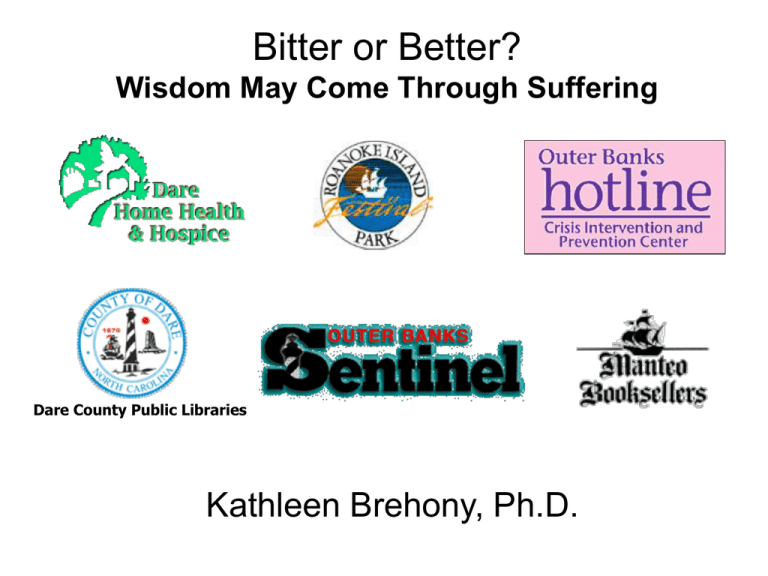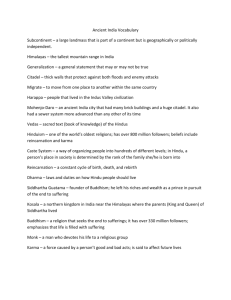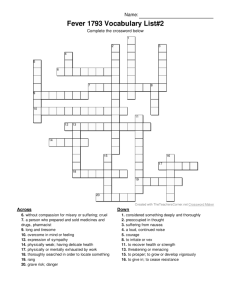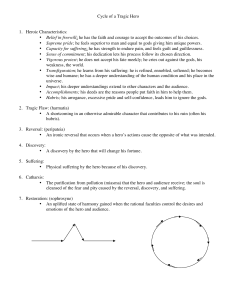
Bitter or Better?
Wisdom May Come Through Suffering
Dare County Public Libraries
Kathleen Brehony, Ph.D.
Suffering, Loss & Grief Arise From Many
Sources
Death of a Loved One
Loss of Independence
Diagnosis of Serious Illness
Fired/Laid Off/Downsized
Disability or Impaired Health Financial Ruin
Divorce/Lost Love
Disappointment/Unmet Expectations
Failure
Midlife: Torschlusspanik (“Fear of a
gate closing”)
etc.
Important Self-Reflections
What can I learn from life’s
challenges?
How can I reduce the negative
effects of what I’m going through?
How can I grow through my
life’s inevitable losses?
Better or Bitter?
The Phoenix
“The Gods have decreed that
the ONLY true human path to
wisdom is by way of suffering”
Aeschylus, 6th-century B.C.E.
“The Father of Tragedy”
Mystics of all spiritual and wisdom
traditions agree that suffering is the
only key that opens the door to
transformation of the soul and
psyche.
The process of Enlightenment is the “Dark
Night of the Soul” – John of the Cross
“Pain is a treasure for it contains mercies.” “Spring
seasons are hidden in the autumns.” -- Rumi
“Suffering is the swiftest steed that brings us
to perfection.” – Meister Eckhart
Buddhism’s First Noble Truth: Life is
suffering: “The value of human life lies
in the fact of suffering, for where there
is no suffering, no consciousness of
karmic bondage, there will be no power
of attaining spiritual experience and
thereby reaching the field of
nondistinction. Unless we agree to
suffer, we cannot be free of suffering.”
-- D.T. Suzuki, Zen Master
“When sufferings come upon him,
man must utter thanks to God, for
suffering draws man near unto the
Holy One, blessed by He.”
– Rabbi Eleazar Ben Jacob (4th Century)
“…Suffering produces endurance, and
endurance produces character, and
character produces hope, and hope
does not disappoint us, because God’s
love has been poured into our hearts
through the Holy Spirit that has been
given to us.”
– Bible, Romans 5:3-5
“Character cannot be developed
in ease and quiet. Only through
experience of trial and suffering
can the soul be strengthened,
vision cleared, ambition
inspired, and success
achieved.”
– Helen Keller
“Seeing much, suffering much,
and studying much are the three
pillars of learning.”
– Benjamin Disraeli
“The ultimate measure of man is not
where he stands in moments of
comfort, but where he stands at
times of challenge and controversy.”
-- Dr. Martin Luther King, Jr.
“What does not destroy me,
makes me stronger.”
-- Friedrich Nietzsche
Major Illusion: Things Don’t Change
Most of us grow when life pushes us to do so
What the
heck is he
talking
about??!!
You know what I’m going
to do this weekend, honey?
I’m going to grow.
It is not necessary nor
desirable to romanticize
suffering, but suffering is
an inevitable part of life.
“I do not believe that sheer suffering
teaches. If suffering alone taught, all the
world would be wise, since everyone
suffers.”
-- Anne Morrow Lindbergh
Instead of learning through suffering,
some people fall apart. Instead of
growing, they become angry, jaded,
self-pitying, pessimistic and closehearted – stuck forever in endless
Sturm and Drang.
What makes some people better – wiser,
more compassionate, more joyful in life
while others become bitter through
suffering? A Central Question!
Compassion is a central spiritual
value, and we’re not here to
judge who deserves it and who
doesn’t. It’s important to show
kindness and patience to people
who have become hard because
they’ve suffered. We have a
responsibility to help.
Mark O’Brien – Breathing Lessons
NO SURRENDER
A Defiant WRITER concedes only what he must to the
iron lung that sustains and confines him
Expansion of Consciousness
Buddhist Teaching Story
explains consciousness:
I Am Awake!
“Buddhism begins with a man
who shook off the daze, the doze,
the dream-like inchoateness of
ordinary awareness. It begins
with the man who woke up.”
– Huston Smith
What Does It Mean to be Conscious?
From the Latin conscius, meaning “knowing with
others, participating in knowledge, or aware of.”
Includes all the things we are aware of and know
An understanding of “knowing that we know”
Sometimes builds slowly and sometimes comes
like a blinding insight
Awakening
A dynamic process of growth, change, and
evolution
Consciousness best defined on a spectrum or
continuum rather than “all or none”
The Expansion of Consciousness Leads
to:
The Search for Meaning
Frankl chose “to be worthy of suffering” – as
Dostoyevski had once written – and rise above his
outward fate, by making inner, conscious decisions
about how he would respond to his circumstances.
“Once an individual’s search for meaning is
successful, it not only renders him happy but also
gives him the capability to cope with suffering.”
-- Viktor Frankl,
Man’s Search for Meaning
Real Suffering Cannot be Avoided
“Real suffering is an authentic and realistic response to the
ragged wounds of living a human life. It’s also unavoidable
and an essential part of every human life. Illness, loss of
loved ones, disappointment, decline, death, limitations, and
imperfections startle and shake us. But they awaken us to
find meaning, dignity, and significance in our lives. They open
the heart to pure compassion and newfound creative energy.
Real suffering is useful. It propels us to new levels of
consciousness and self-knowledge. It is through suffering and
pain that we break down our habitual barriers between
ourselves and others and allow for the entrance of a
transpersonal, transcendent perspective: a full appreciation of
our intimate and profound spiritual connections.”
-From “After the Darkest Hour” pg. 21
Neurotic Suffering Can Be Avoided
Neurotic suffering offers no meaning. Jung called
it “an unconscious fraud,” declared it bogus and
with no moral merit. Neurotic suffering is a flight
from the wounds of life and an unconscious – and
unsuccessful – attempt to heal them. Neurotic
suffering is a refusal to discover the meaning in
our pain through a childish insistence that things
should be as we want them to be and not as they
are. It is expressed as self-pity and envy toward
people whose lives seem better or less difficult.
-- From “After the Darkest Hour” pg. 22
To Jung, neurosis itself must be
understood, ultimately, as the
“suffering of a soul which has
not discovered its meaning.”
Real versus Neurotic Suffering
“Real suffering burns clean; neurotic
suffering creates more and more soot.”
-- Marion Woodman (Author and Jungian Analyst)
Real suffering is required for psychological
and spiritual maturation. Without it, one
would remain unconscious, infantile, and
dependent. It demands questions:
Who am I?
What is my purpose here?
Where do I find meaning in my life?
What is my relationship to God or
some higher, transpersonal power?
The Path to the Self
Teleological Process toward the Self
Michelangelo
The path of
individuation:
seek meaning rather
than happiness
“He who has a why to live can
bear with almost any how.”
-- Viktor Frankl
On the True Nature of Reality
Or
The Absolute Truth About Life
The Wheel of Life
The Consolation of Philosophy
(De consolatione philosophiae)
Anicius Manlius Severinus
Boethius (480-524 C.E.)
Our modern world offers both the
mindset and the pharamacology to
diminish feelings that other generations
may have used to initiate a personal
journey of growth and change.
The Latin root of the word
“Suffering” means “to
experience” or “to allow.”
This is not the view of our
modern world that wants to
forego all suffering before it’s
meaning can be understood.
Sales of Prozac alone account for
more than $2 billion dollars a year –
one of the world’s most popular
drugs.
Prescriptions for anti-depressants
have tripled since 1996 as hundreds
of thousands of people turn to pills to
cope with life.
More than 1 million US children
take an antidepressant – up 60%
from the mid-1990’s
Approximately one fifth (20.5 percent) of
persons aged 12 or older participated in
binge drinking at least once in the 30 days
prior to the (2001) survey. Although the
number of current drinkers increased
between 2000 and 2001, the number of
those reporting binge drinking did not
change significantly.
Heavy drinking was reported by 5.7
percent of the population aged 12 or older,
or 12.9 million people.
Source: US Department of HHS
The National Institute on Drug Abuse's
2003 Monitoring the Future survey of 8th,
10th, and 12th graders found that 10.5
percent of 12th graders reported using
Vicodin for non-medical reasons and 4.5
percent of 12th graders reported using
OxyContin without a prescription.
Each year, drug and alcohol abuse
contributes to the death of more than
120,000 Americans. Drugs and alcohol cost
taxpayers more than $294 billion annually in
preventable health care costs, extra law
enforcement, auto crashes, crime and lost
productivity.
Holding the Tension of the Opposites:
Between the alleviation of suffering
and honoring the circumambulating
path of individuation
We are not alone!
Suffering is a universal
human experience.
Everyone’s life is a drama
The Story of Kisagotami
“God sends rain on the righteous
and unrighteous alike.”
-- Matthew 5:45
Perspectives on suffering in the JudeoChristian view are reflected in the
Old Testament Book of Job
Invented and Engraved
by William Blake - 1825
Job is a successful man with every bounty life can
bestow – still he is God-loving, “blameless and upright.”
Satan goes before the throne of God – “Big Deal!”
It’s easy for Job to love God and be “blameless and
upright” when he’s got it made!
Job’s loses his property and his children:
seven sons and three daughters are killed
Messengers tell Job of his misfortunes
Satan smites Job with boils
Job’s Comforters –
they see that his suffering is great
God answers Job out of a whirlwind
God shows Job all that he has created – Could you
have made the stars? How about “Let there by light?”
…And how about this behemoth and
leviathan that I made?
Job and his daughters
God blesses Job more than at the beginning
Issues raised in the Book of Job
Why me?
“If you suffer, it must be because you have done
something to deserve it.”
A conversation and personal relationship with
God results for Job.
The Book of Job as a Story of the Self.
We may never understand why good people
suffer, but in the process of breaking down – his
“dark night of the soul” – Job learns that he can only
live with the paradox, experience the mystery.
Positive Thought for the Day:
If you only live long enough,
you will lose everything.
Ignorance about the reality of life is a
root cause of suffering. When you
deny the reality of life, you appreciate
it less.
Buddhism’s Five Remembrances
1. I am of the nature to grow old. There is no way to escape
growing old.
2. I am of the nature to have ill health. There is no way to
escape ill health.
3. I am of the nature to die. There is no way to escape death.
4. All that is dear to me and everyone I love are of the
nature to change. There is no way to escape being
separated from them.
5. My actions are my only true belongings. I cannot
escape the consequences of my actions. My
actions (karma) are the ground upon which I stand.
Interpretation by Thich Nhat Hahn
Existence it seems
is, “living our lives
saying goodbye.”
– Rainer Maria Rilke
Everyone suffers
Suffering can be the force that
knocks out our illusionary
beliefs about life and thrusts
us toward new consciousness
about ourselves and the true
nature of reality
The Vitality of Transformation
Like Buddha -- We Are Awake
Realize the values of the first half of life
are not sufficient for the second half
Change in philosophy and worldview
Psychological and spiritual maturity
Coming to our senses
Live differently – with greater joy,
meaning, and passion
Buddhism’s First Noble Truth
“Life is Suffering.”
Accurate Translation:
Life is dukkha.
Dissatisfaction,
discontent, dislocated
A Few True Things
1. Change is the natural order of the
universe
2. Change always incorporates loss
3. We cannot control all the events of
our lives but we can control our
responses to them
4. There are hidden gifts in suffering
Many Spiritual and Wisdom
Traditions teach the importance
of knowing that change is
inevitable and the natural
course of the Universe…
Hello!!! Is anyone
listening?!!!
Change is the Natural Order of the Universe
This existence of ours is as transient as
autumn clouds.
To watch the birth and death of beings is
like looking at the movements of a dance.
A lifetime is like a flash of
lightning in the sky,
Rushing by, like a torrent down a steep
mountain.
“No man ever steps in the
same river twice, for it’s not
the same river and he’s not
the same man – Nothing
endures but change.”
-- Heraclitus
Navajo Sand Painting of
Father Sky and Changing
Woman – Changing Woman
represents the Earth and the
Seasons of Life
Changing Woman represents the cyclical
path of the seasons [nináhágháhígíí], birth
(spring); maturing (summer); growing old
(fall); and dying (winter), only to be reborn
again in the spring.
Sand Mandala
“Mandala” is the Sanskrit word for “Circle” and this
image is a symbol of the Universe and its Energy.
Tibetan monks create these archetypal templates in
sand to remind us of the cycle of life and death.
“All true things must change and only
that which changes remains true.”
-- Carl Jung, “The Nature and Activity of the Psyche”
Twelfth Century Europe
Western Esoteric Tradition
…Even Pat Sajak and Vanna White
have tried to teach us this point!
Sony Pictures Television
Our false and
illusionary belief in
permanence is the
“rickety foundation”
upon which most of
us construct our lives.
Pain is inevitable,
suffering is optional.
-- Zen Proverb
All Change incorporates Loss
even those changes we deem to
be good and to our advantage.
We cannot determine the events of our life,
but we can determine our responses to them.
Meaning is found in the fact that human beings are
self-determining. Although we cannot always change
the fact that terrible things will happen to us, we
have every power to respond to those painful events
in our lives. We do not simply exist but have the
intrinsic authority – this “last of human freedoms” –
to decide what our existence will be, what we will
become in the next moment.
“We must never forget that we may also find
meaning in life even when confronted with a
hopeless situation, when facing a fate that
cannot be changed.” – Viktor Frankl
Gifts Hidden in Suffering
Or
Turning Lead Into Gold
“God does not want us to be burdened because of
sorrows and tempests that happen in our lives,
because it has always been so before miracles
happen.”
-- Julian of Norwich, 14th Century Mystic
“It is by going down into the abyss that we recover
the treasures of life.”
-- Joseph Campbell
The Alchemical Metaphor
“We are born to be
awake, not to be asleep!”
-- Paracelsus, 16th Century Swiss
Alchemist
The Power of Alchemy
“The truth of alchemy is discovered
when we accept it as metaphor – an
intricate allegory – for consciousness
and as a clearly defined path for both
spiritual and psychological
development in which suffering and
loss are seen as initiating events.”
From: After the Darkest Hour
Stages in Transforming Lead Into Gold
Nigredo: “The Blackening”
Albedo: “The Whitening”
Rubedo: “The Reddening”
Another Image – The Chrysalis
“Sacrifice” from the Latin “sacrificium” – means the forfeiting of
something of importance in the service of receiving something of
even greater value. Literally means, “to make holy.”
How prepared are you for the
inevitabilities of a human life?
Uneven Playing Fields
Straw Houses
Illusions
The Problem with Straw Houses
Overflowing Glass
Stress, suffering, pain,
hard times, challenges
How full is
your glass?
Principles of Deductive Logic
A specific conclusion will be
accepted based on one or
more premises. If the premises
are true, then the conclusion
must also be true. Thus, if A (a
general statement) is true and
B(a specific statement) is true,
then C (the conclusion)must
also be true. Yada, yada, yada.
Deductive Reasoning Syllogism
A. All normal dogs are born with one head and
four legs. (General Statement)
B. Dorothy is a normal dog. (Specific Statement)
C. Dorothy has one head and four legs.
(Conclusion)
Hey, that’s true!
Typical Syllogism That Leads to
Self-Imposed Suffering
Premise A**: I am worthless, stupid, and
will never amount to anything. (General)
Premise B: I failed my exam. (Specific)
Conclusion C: I truly am worthless and
stupid. I’ll never amount to anything.
**Premises based on one’s history, experience, belief system,
worldview etc.
Psst. Here’s
the BIG
SECRET!
Negative Self-Image Leads to Suffering Because…
The unconscious cannot
differentiate between false versus
true premises as it draws all of its
conclusions by way of deductive
logic syllogisms.
Ways You Can Tell You Are Adding to Your Suffering Through
Negative Self-Image and Negative Self-Talk
“That’s just the way I am.”
“I could never do that well.”
“People like me can’t ______ (be
successful, change, overcome obstacles,
learn to tap dance, fill in your own “can’t”).
Any number of Self-Fulfilling Prophecies.
To hold onto Self-Injurious
Scripts or to Manage Our Lives
in Ways that determine that we
will suffer in the future – is like a
train wreck waiting to happen.
Commonly-Held Illusions
and Suffering
Life is fair.
I’m immune from Life’s realities.
I’m in total control. I create my life.
If something bad happens to me, I
must have done something to deserve it.
Resiliency
“Resiliency” from the Latin resilire – “to spring back.”
Characteristics of Resilient People
Insight (includes Sensing, Knowing & Understanding
Independence (includes Distance and Separating)
Relationships (includes Recruiting and Attaching)
Initiative (includes Problem Solving and Generating)
Creativity and Humor (includes Creative Thinking,
Creating to Express Feelings and Humor)
Morality (includes Valuing and Helping Others)
General Resilience (includes Persistence and Flexibility)
“Deep, unspeakable suffering
may well be called a baptism, a
regeneration, the initiation into a
new state.” -- George Eliot, Adam Bede
“Life as we have known it is now
over.” – Marion Woodman
“There is a pain so ‘utter’.”
-- Emily Dickenson
How can we move beyond
mere resiliency and grow
through our suffering?
The Hero’s Journey
“We have only to follow the thread of the hero path, and where we
had thought to find an abomination, we shall find a god. And where
we had thought to slay another, we shall slay ourselves. Where we
thought to travel outward, we will come to the center of our own
existence. And where we had thought to be alone, we will be with
all the world.”
-- Joseph Campbell, The Power of Myth
Stages of the Hero’s Journey
The Call
The Separation
The Adventure
The Return (Hero is ALWAYS changed)
“There are only two or three human stories
and they go on repeating themselves as
fiercely as if they never happened before.”
-- Willa Cather, O Pioneers!
The story of the Hero is “the only one worth
telling.” “For the heroes of all time have
gone before us. The labyrinth is thoroughly
known.” -- Joseph Campbell
Here’s what the Hero’s Journey means
in Hollywood – in Three Acts:
Act I
Get the Hero up a tree.
Act II Throw rocks at him.
Act III Get him down.
Quiet on the set! Action!
“Life is filled with Defining Moments.
Cancer is one of mine.”
Robert Urich
1946-2002
Loss, Change, Suffering act
as the Call or Initiation to the
Hero’s Journey. They can
be “Wake-Up Calls.”
Luck, Destiny & Free Will
August 9, 1945, 11:02AM
An Atomic Bomb (“Fat
Boy”) was dropped on the
Japanese city of
Nagasaki, but the original
target was the city of
Kokura. Clouds covered
Kokura that day and the
bomb could not be
dropped there.
The Three Fates or Moerae
decide the inescapable destiny of men and Gods alike.
Lachesis – The Lot Giver
Klotho – The Spinner
Atropos – The Inflexible
Are we entirely bound by the
inevitable, inescapable
vagaries of the gods?
The Sophists, Socrates, Plato,
Aristotle, and Heraclitus disagreed
with the idea of the “The Fates”
“A man’s character is his fate.”
-- Heraclitus
“Men at some time are masters of their
fates: The fault, dear Brutus, is not in
our stars, but in ourselves.”
-- William Shakespeare (Julius Caesar)
“Character is our destiny.”
-- Novalis (German poet)
The 3rd-Century neo-Platonic
philosopher Plotinus endorsed the
idea that the soul selects everything
about our life before we are born.
Hmm. I think I’ve
already forgotten
what I agreed to
up there!
An ancient Jewish legend speaks to how we
have forgotten the soul’s prenatal choices about
the events we will encounter in life. The story
says that the truth is pressed right into your
upper lip. That little indentation (the philtrum)
below your nose is all that’s left to remind you of
your pre-existent soul life. That’s why, it is said,
when we conjure up a lost thought or an insight,
our finger naturally moves to that significant
dent. This is, according to the tale, where the
angel pressed its forefinger to seal your lips.
This idea that we have
ultimately selected our life
experiences, while rich in
metaphysical implications,
can bring us to the slippery
slope that people create
ALL of their own fate, ALL
of their own suffering. A
dangerous viewpoint.
Destiny and Free Will are
engaged in an intimate
and subtle dance.
“When the cards are dealt
and you pick up your hand, that
is determinism; there’s nothing
you can do except to play it out
for whatever it may be worth.
And the way you play your hand
is free will.”
-- Jawaharlal Nehru
We are Co-Creators of
our Destiny!
Good Luck? Bad Luck? Who Knows?
“Do you have the patience to wait
till your mud settles and the water is
clear? Can you remain unmoving till
the right action arises by itself?”
-- Tao te Ching
“Where there is good, there must
be bad; the transition from one to
the other is truly like turning over
one’s hand.”
-- Lu Wang, 12th Century Chinese Philosopher
How lovely!
Through the torn paper screen
The Milky Way
Haiku by Issa
Learned Helplessness – the failure to avoid or
escape from an unpleasant or aversive stimulus that
occurs as a result of previous exposure to
unavoidable painful stimuli.
Learned Helplessness has been
observed in dogs, rats, mice, cats,
monkeys and even Walleyed Pike!
On Elephants and Fleas
Rowing AND Flowing
The Middle Way
The Middle Way
Gautama Siddhartha
th
6 Century, B.C.E.
“Impermanent are all created things;
Strive on with awareness.”
Jung’s Transcendent Function
A psychic function that
arises from holding the
tension of the opposites.
In all dualities, the wise strive
to “hold the tension of the
opposites” to integrate and
balance opposing forces.
The Serenity Prayer
by Reinhold Niebuhr
God grant me the Serenity to
accept the things I cannot
change; Courage to change
the things I can; and Wisdom
to know the difference.
Pray to God,
but row for the shore!
Russian Proverb
Trust in Allah, but first
tie your camel to a post!
Arabian Proverb
The Path With Heart
“Look at every path closely and deliberately.
Then ask yourself and yourself alone one
question…Does this path have a heart? If it
does, the path is good. If it doesn’t, it is of
no use.”
-- Don Juan, Yaqui sorcerer
Ways We Add to Suffering
Resistance to change
Expectation that life is always fair
The illusion of egoism (separateness)
Failure to take responsibility for responses
Ruminative suffering
Failure of compassion
Unconscious approach to life
What can each of us learn
that will brace us for our next
inevitable bout with suffering?
How can we best respond to
life’s difficulties and
heartbreaks in ways that will
help us grow?
Two True Things
1. Everyone suffers
2. Suffering can be the force that
knocks out our illusionary beliefs
about life and thrusts us toward new
consciousness about ourselves and
the true nature of reality
12 Strategies
For
Growing Through Suffering
#1 Discover a Larger Perspective
The Eagle Nebula – 7 Million Light Years Away
Some Ways of Discovering a Larger
Perspective
Explore religious & spiritual traditions
Read about your own tradition
Take classes in philosophy, metaphysics
or other disciplines
Investigate your family genealogy
Look to nature
Write down or sketch your thoughts and
reflections
Sand and Water
All alone I came into this world
All alone I will someday die
Solid stone is just sand and water, baby
Sand and water and a million years gone by
Words and Music by Beth Nielsen Chapman. All rights reserved.
#2 Turn Toward Compassion
and Help Others
Look at the things you say to
yourself when you’re in pain
Find a voice that expresses
compassion to others AND to
yourself
Fuel your compassion with action
– Volunteer
“Illumined Selfishness” – Healthy Self-Care
Nurture BodyMindSpirit
Physical Regimen to Deal with Stress
Quiet Time for Reflection, Prayer, Meditation, Solitude
Creative Activities
Social Support – Talk About It!
Spiritual Support
Optimism
Humor
Approach NOT Avoidance
Cognitive Reframing
Caregivers often think we are the “Energizer Bunny” and can keep
going and going and going – This is a dangerous belief!
#3 Recognize and Stop Self-Imposed Suffering
Listen to the wake-up calls about the things you
do in your life
Look honestly at your feelings about yourself
Surround yourself with good company and
lovingly avoid negative people
Forgive yourself
Change your inner self-talk
Don’t set perfectionistic goals
Celebrate your strengths and achievements
Gravel in Your Knee Can Hurt for a Lifetime
We see the world through “transparent templates”
which we create and then attempt to fit over our
realities. We use these personal constructs to
predict the things to come. This worldview causes
unnecessary suffering.
“You are not the victim of your autobiography. But
you may become the victim of the way you
interpret your autobiography.”
-- George Kelly, American Psychologist
Negative anticipations of our present
and future (based on uneven playing
fields, past trauma, etc.) is what Viktor
Frankl referred to as the “expectation of
dysfunction” and what psychologist
George Kelly called, “being prisoners of
our biographies.” It is an extremely
self-limiting point of view and adds to
unnecessary suffering.
Holding on to a Negative SelfImage and Negative Self-Talk
Believing in Illusions
Avoiding fixing things that can
and will lead to suffering
#4 Practice Mindfulness
“Stay here, quivering with each
moment, like a drop of mercury.”
-- Rumi
“Thursday”
by William Carlos Williams
I have had my dream – like others –
And it has come to nothing, so that
I remain now carelessly
With feet planted on the ground
And look up at the sky –
Feeling my clothes about me,
The weight of my body in my shoes,
The rim of my hat, air passing in and out
At my nose – and decide to dream no more.
“This afternoon, I have found quiet hours
alone picking tomatoes. As my fingers find
ripe tomatoes, red and firm, through the
labyrinth of leaves, I am absorbed into the
present. My garden asks nothing more of
me than I am able to give. I pull tomatoes,
gently placing them in the copper colander.
Pulling tomatoes, pulling tomatoes. Some
come easily.”
-- Terry Tempest Williams, Refuge
Practice Mindfulness
Practice daily meditation or pray
Read books about mindfulness
Tap into community support (e.g., yoga
or a spiritual community)
Find your unique path
Live in the present moment
Let yourself feel everything
#5 Grieve
“We’re healed from suffering
only by experiencing our
grief to the full.”
-- Marcel Proust
“Grief” from the Latin gravis meaning
“heavy” or burdened.”
“Bereavement” from reave means to
be “dispossessed or robbed.”
“A divine and terrible radiance.”
– Victor Hugo
“A pain so utter.” – Emily Dickinson
Grieve
Recognize and acknowledge when you are
grieving
Let yourself feel the pain
Sometimes find diversions
Express your sorrow, Talk about it
Forgive yourself
Take care of your physical self
Be aware of “anniversary reactions”
Get help if you need it
Help others through their grief
#6 Build Good Containers
“No Soul is desolate so long as there is a
human being for whom it can feel trust and
reverence.”
-- George Eliot
“We are here to awaken from the illusion of our
separateness.”
-- Thich Nhat Hanh
Maslow’s Hierarchy of
Needs
A Thousand Words for Snow
Become a Lake
Namaste and Aloha:
Recognizing our deep
and transcendent
relationship to all
beings
Containers
Shore up your connections in
your family by frequent contact
Create a family from friends
Build your containers BEFORE
you need them (Dig your well
before you’re thirsty)
Be a good container to others
in your life
#7 Count Your Blessings &
Discover the Power of Optimism
“No pessimist ever discovered the
secrets of the stars, or sailed to an
uncharted land, or opened a new
heaven to the human spirit.”
-- Helen Keller
“If the only prayer you said
in your whole life was ‘Thank
you,’ it would be sufficient.”
-- Meister Eckhart
Optimistic versus Pessimistic Cognitions
During Hard Times
Optimistic
Pessimistic
Temporary
Permanent
Specific
Pervasive
External
Personal
Source: Martin Seligman, Learned Optimism
Blessings & Optimism
Always, and particularly during hard times,
look around at the blessings in your life
Calm your mind through meditation, yoga,
prayer, quiet time alone, and nature
Look at your own levels of optimism and
pessimism. How do you rate yourself?
Share the blessings you have with others
#8 Find Courageous Role
Models & The Hero Within
“Avoiding danger is no safer in the long
run than outright exposure. Life is either
a daring adventure or it is nothing.”
-- Helen Keller
Role Models & The Inner Hero
Sit quietly and reflect on your
heroes
Study to learn more about them
Write a story – how would your
hero deal with your present
challenge?
#9 Keep a Sense of Humor
“Humor is a prelude to faith and
laughter is the beginning of prayer.”
-- Reinhold Niebuhr
Humor
Don’t ever be afraid to step back
from your suffering and laugh
Share your laughter with others
#10 Express Your
Feelings
“There is no grief like the grief
which does not speak.”
-- Henry Wadsworth Longfellow
Express Yourself
Talk about your suffering with a friend,
therapist, priest, minister, rabbi, imam, or
chaplain
Listen to others when they need an ear
Express your suffering through art or ritual
Process
and the
Story of the
Chinese Potter
#11 Silence, Prayer & Meditation
“There is nothing in all creation
so like God as stillness.”
-- Meister Eckhart
Silence, Prayer & Meditation
Set aside time each day to meditate or pray
Read, practice and learn about the many
types of meditation and prayer
Discover the joys of prayer and meditation
with others through a place of worship or
spiritual community
Learn to love silence
Ask your friends and family to keep you in
their prayers
#12 Come to Your Life Like a Warrior
“The difference between an ordinary person
and a warrior, is that a warrior takes
everything as a challenge while an ordinary
man takes everything as either a blessing or a
curse.”
-- Don Juan, Yaqui Sorcerer
The ABC’s of Living as a Warrior
A
Awareness
B
Bravery
C
Compassion
D
Discipline
Live Like a Warrior
Gently but honestly look at yourself and your life
in relations to the four warrior characteristics. Where
are you strong? Where do you need work?
Work out a specific plan to keep yourself
physically, psychologically, and spiritually strong.
Every morning ask yourself one question: “What
do I need to do today to take greater responsibility
for my life and live with the passionate vitality of a
warrior?”
This being human is a guest house…
“Open the door to your guest house.
Say “yes” to all of your life. Choose to
live joyfully even in your pain. Love
yourself and everyone else. Be
present always – alive to every
moment. Grieve when you should,
fight when you can, accept when you
must. But above all, say yes.”
-- From “After the Darkest Hour” pg. 262
Thank you for coming and Godspeed on your
journey
Vocatus ataque non
vocatus, Deus aderit.
(“Called or not called,
God will be there.”)
Kelly
www.fullpotentialliving.com
252-473-4004
Kathleen and co-author Dorothy





